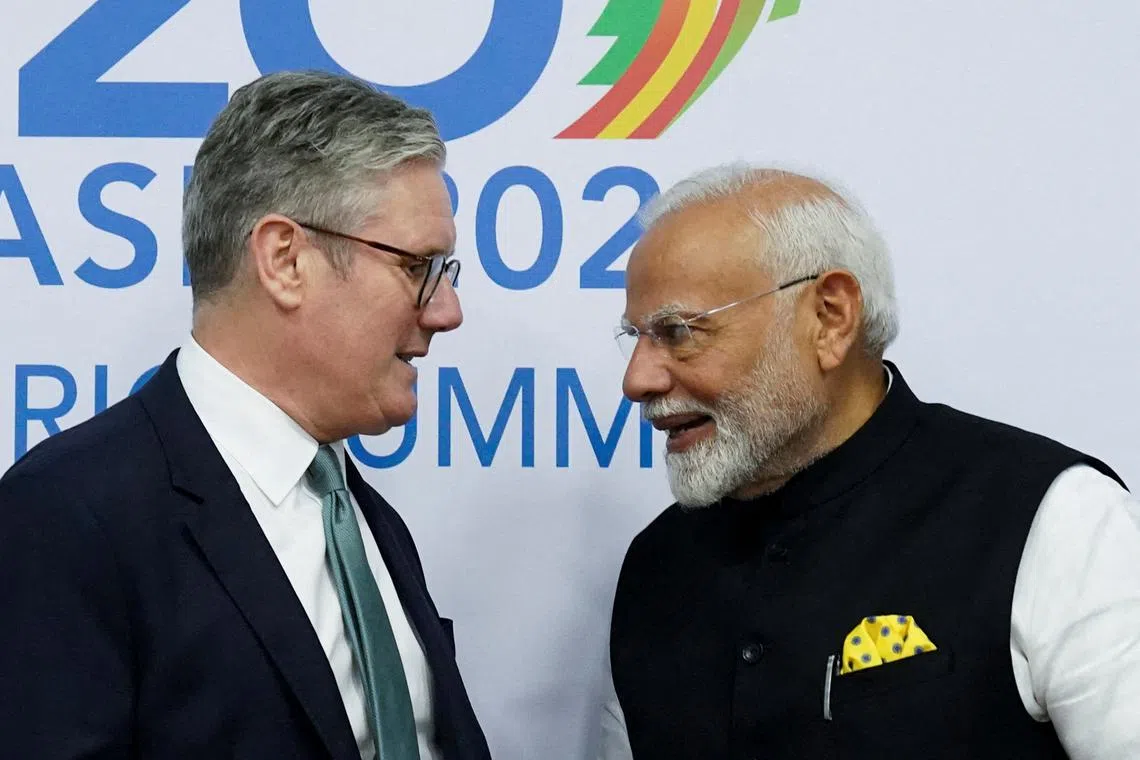Britain and India to sign landmark free trade pact during Modi visit
Sign up now: Get ST's newsletters delivered to your inbox

British Prime Minister Keir Starmer (left) meeting Indian Prime Minister Narendra Modi on the sidelines of the G-20 summit in Brazil, on Nov 18, 2024.
PHOTO: REUTERS
LONDON/NEW DELHI - Britain and India will sign a landmark free trade agreement on July 24 during a visit by Indian Prime Minister Narendra Modi, sealing a deal to cut tariffs on goods from textiles to whisky and cars and allow more market access for businesses.
The two countries concluded talks on the long-coveted free trade pact in May after three years of stop-start negotiations, with both sides hastening efforts to clinch a deal in the shadow of tariff turmoil sparked by US President Donald Trump.
The agreement between the world's fifth- and sixth-largest economies aims to increase bilateral trade by a further £25.5 billion (S$44.2 billion) by 2040. It will take effect after the British Parliament and India's federal Cabinet approve it, likely within a year.
"Our landmark trade deal with India is a major win for Britain. It will create thousands of British jobs across the UK, unlock new opportunities for businesses and drive growth," British Prime Minister Keir Starmer said.
The agreement will be signed during Mr Modi's fourth visit to Britain since he took office in 2014. The leaders will also sign a strategic partnership covering areas such as defence and climate, and strengthen cooperation on tackling crime.
Under the trade agreement, tariffs on Scotch whisky will drop to 75 per cent from 150 per cent immediately, and then slide to 40 per cent over the next decade, according to the British government. On cars, India will cut duties to 10 per cent from over 100 per cent under a quota system that will be gradually liberalised.
In return, Indian manufacturers are expected to gain access to the British market for electric and hybrid vehicles, also under a quota system, Indian Commerce Ministry officials said.
The ministry has said 99 per cent of Indian exports to Britain would benefit from zero duties under the deal, including textiles, while Britain will see reductions on 90 per cent of its tariff lines.
The agreement represents Britain's most significant trade deal since it left the European Union in 2020, though the projected boost to British economic output, of £4.8 billion a year by 2040, is small compared with the country's gross domestic product of £2.6 trillion in 2024.
The deal will also facilitate easier access for temporary business visitors, though visas are not covered. Britain and India also agreed to ensure workers no longer have to make social security contributions in both India and Britain during temporary postings in the other country.
Under the trade deal, British firms will be able to access India's procurement market for projects in sectors such as clean energy, and it also covers services sectors such as insurance.
India did not succeed in its efforts to get an exemption from Britain's Carbon Border Adjustment Mechanism – which could levy higher taxes on polluters from 2027 – as part of the deal.
The two sides also have not concluded talks over a separate bilateral investment treaty, which were held in parallel to trade negotiations but still continue. REUTERS


